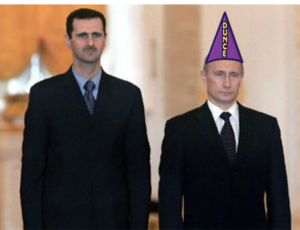One of the fundamental tenets of counter-intuitive thinking requires individuals to make sure they are asking the right questions before seeking the right answers. Sadly, this is something the corporate news media did not understand concerning their coverage of Thursday night’s U.S. missile attack on Al Shayrat Airfield. Over the past 36 hours, print and broadcast news have focused on four questions.
- Was this an appropriate response to the use of chemical weapons against the residents of Idlib Province, Syria?
- Should Trump have sought Congressional authorization before launching the attack?
- What are the political implications?
- What next for the U.S. in Syria?
All of these questions have one thing in common. The answers are a matter of opinion. In other words, the media were more interested in stimulating debate among their talking heads than getting to the bottom of what happened and why?
Here are the questions I believe we should be asking.
Why now?
In September 2013, the United States and Russian brokered a deal by which Syria agreed to turn over all of its chemical weapons and facilities to the Organization for the Prohibition of Chemical Weapons, the international watchdog created as part of the Chemical Weapons Convention of 1993. Whether the transfer was complete is a matter for debate. Regardless, Syria had ceased using sarin gas for more than three years until Tuesday’s attack.
To answer this question, one need merely look at what had changed since September 2013. The most obvious answer is U.S. policy toward the Assad regime. Until January 20, 2017, the Obama administration believed the Syrian civil war would not end as long as Assad remained in power. On March 30, 2017, Secretary of State Rex Tillerson reversed this policy, stating, “I think the…longer term status of president Assad will be decided by the Syrian people.” Four days later Syria launches the chemical weapons attack. It seems Assad took Tillerson’s statement to heart and wanted to ensure only those who supported the dictator would still be alive when the Syrian people determined his long-term status.
Who had the most to lose from the chemical weapons attack?
This is the question I find most puzzling. The 2013 agreement on chemical weapons did not stop Assad’s massacre or dislocation of his own people. The international community turned a blind eye to his use of massive air power and barrel bombs on towns controlled by rebel forces. The ONLY thing that would get the world’s attention was the re-introduction of chemical weapons into the conflict. Why would Assad take that chance?
I have not used this blog to peddle conspiracy theories and I will not start now. But Assad’s actions make absolutely no sense without a quid pro quo. What could Assad possibly get in return for such irrational behavior?
Why would Comrade Trump call Vladimir Putin prior to the attack?
Again, I will leave this one to the conspiracy theorists. But it does raise more questions. What was Russia’s role in the chemical attack? Was U.S. intelligence aware of a Russian presence at Al Shayrat Airfield? If the attack was meant as a signal the use of chemical weapons was “crossing a red line,” why would the Trump administration make sure the Russians did not get the message the same that it was delivered to the Syrians?
Why is Russia so vigorously defending Assad?
 While I understand Russia views Syria as its foothold in the Middle East, Assad’s use of chemical weapons puts Putin in an awkward position. After all, Putin took credit for the September 2013 deal which deferred military action against Assad. The use of sarin gas in Idlib Province is a political embarrassment for Putin. At a time when he is trying to convince European leaders he is an ally against terrorism, Assad has exposed him as a “paper tiger,” unable to enforce agreements with his current geopolitical partners.
While I understand Russia views Syria as its foothold in the Middle East, Assad’s use of chemical weapons puts Putin in an awkward position. After all, Putin took credit for the September 2013 deal which deferred military action against Assad. The use of sarin gas in Idlib Province is a political embarrassment for Putin. At a time when he is trying to convince European leaders he is an ally against terrorism, Assad has exposed him as a “paper tiger,” unable to enforce agreements with his current geopolitical partners.
My favorite Judge Judy line is, “If it doesn’t make sense, it probably isn’t true.” And if anything ever didn’t make sense, this is it. It’s time the news media stops speculating what will happen next and focuses on the reasons behind what has already happened.
For what it’s worth.
Dr. ESP

Brookings Institution – 5 takes on Trump and Syria.
https://www.brookings.edu/blog/markaz/2017/04/07/around-the-halls-what-brookings-middle-east-experts-are-saying-about-the-u-s-airstrikes-on-syria/